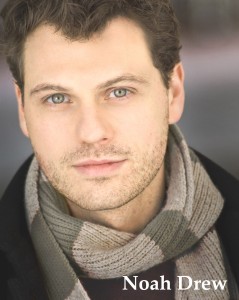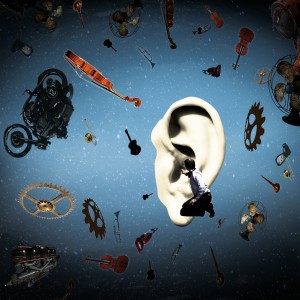No more performances
Posted February 27, 2014
There’s nothing tiny about Tiny Music: A Sound Design Musical. There are songs but it’s not really a musical. There are musicians – piano, accordion, clarinet, violin, drums, bass and ‘live electronics’ – but it’s not a concert. There’s a story, a heartbreaking/heartwarming one, but Tiny Music is much more than a play. Written and composed by Noah Drew, directed and dramaturged by Jamie Nesbitt with musical direction by Yawen Wang, Tiny Music is much more than the sum of its parts. The real pity is that it only had a two-evening run as part of the Chutzpah! Festival; it deserved to run for so much longer. Jump Current, Drew and Nesbitt’s producing company, has now packed it all up and headed back to Montreal.
 In a well-worth reading, Jewish Independent interview (https://www.jewishindependent.ca/archives/feb14/archives14feb14-02.html), Drew talks about the genesis of Tiny Music. After a couple of false starts, he discovered how to get inside Ezra (Anton Lipovetsky), his twenty-three year old autistic character, with language, sound, music and staging. Ezra doesn’t tell us how he experiences the world; we actually share his visceral experience. This doesn’t always make for comfortable listening because Ezra suffers from an auditory-processing disorder: he hears everything. “For Ezra, tiny details of the sonic environment that might go unnoticed by most people are very vivid. Sometimes, these details might mesmerize him. At other moments, they might overwhelm him. And sometimes, he hears the patterns in things so vividly that mundane sounds coalesce and occur for him as music,” explains Drew.
In a well-worth reading, Jewish Independent interview (https://www.jewishindependent.ca/archives/feb14/archives14feb14-02.html), Drew talks about the genesis of Tiny Music. After a couple of false starts, he discovered how to get inside Ezra (Anton Lipovetsky), his twenty-three year old autistic character, with language, sound, music and staging. Ezra doesn’t tell us how he experiences the world; we actually share his visceral experience. This doesn’t always make for comfortable listening because Ezra suffers from an auditory-processing disorder: he hears everything. “For Ezra, tiny details of the sonic environment that might go unnoticed by most people are very vivid. Sometimes, these details might mesmerize him. At other moments, they might overwhelm him. And sometimes, he hears the patterns in things so vividly that mundane sounds coalesce and occur for him as music,” explains Drew.
“ Listen!”, Ezra’s violin teacher Sylvie (Caitriona Murphy) repeatedly demands of him. But when he tells her he is listening and these are some of the things he is hearing – the sound of water moving through an adjoining apartment that tells him the pipes are not made of copper, a vacuum cleaner three floors up, a fridge compressor going on/off and Sylvie’s heartbeat – she is stunned. But together they discover that making music allows him to focus and, to a certain extent, filter out what the rest of us do unconsciously.
Tiny Music is roughly based on The Fiddle, a short story by Sholom Aleichem. In it, a village boy, infatuated with music, ruins his life and the lives of those around him so he promises never to play the violin again. In Tiny Music, Ezra begins – through music – to live his own music and to live his own life. As a friend said to me, “When you play your own music, you never get it wrong.” How profound is that? Ezra, according to our standards of normal behaviour, has been getting everything wrong all his life.

Drew and Nesbitt could not possibly have made a better choice to play Ezra than Anton Lipovetsky. His openness, vulnerability and fragility matched with an enthusiasm so fresh it makes you smile, too, made him perfect. And he’s a musician so he really knows how music feeds the soul – especially when you’re making it.
Ezra’s worried, protective parents were played by Susinn McFarlen and Bob Bossin. McFarlen could have been less strident – although the mother’s acceptance of Ezra’s new independence at the end of the play might not be such a turning point had she been softer and more understanding all along. Bossin’s character – a kind of ‘go with the flow’ ex-hippie was distinctly at odds with his wife. It felt, at times, as if he were in another play.
“I do not excel in areas of social interaction”, Ezra warns Sylvie. Murphy (as Sylvie) was warm, open and good-hearted. Of course, Ezra mistakes Sylvie’s compassion for love but they are not destined to make that kind of sweet music together. And that’s where heartache comes in.
Staging (Nesbitt) and light design (John Webber) made this production visually invigorating. I was not totally convinced with the ropes hanging down from the flies until Ezra ‘plucks’ them and they all began to vibrate like the strings on a stringed instrument.
But what I found most brilliant – and I don’t use the word casually – in Tiny Music is the concept of discovering the music inside us, the music that is uniquely our own. Music students routinely play other people’s music (mostly dead white guys’ music) as they strive for perfection: the perfect Bach fugue, a flawless Chopin Nocturne or a note-perfect Rachmaninoff. Seeking excellence is fine but there should also be room for starting with a single note and seeing where it wants to go; like a single word on a page that becomes a poem; a dab of paint on a canvas that becomes a painting; a musical phrase that becomes a song. This is not merely a message for the autistic; it works for everyone.
Tiny Music was not for everyone; hearing what Ezra hears is unsettling. But I was close to tears when Ezra understands that music has given him a life and he can say, “This is my life.”


